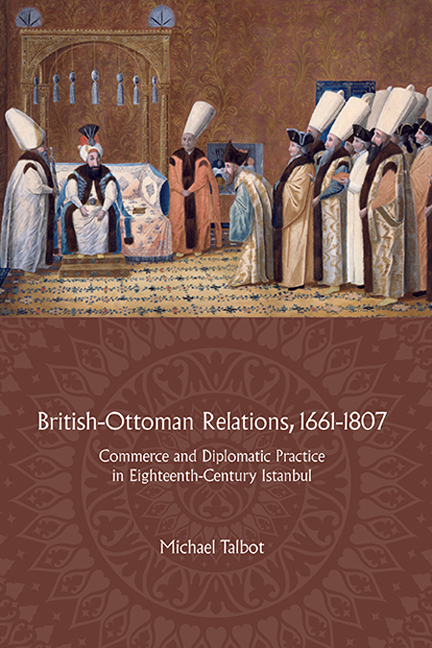 British-Ottoman Relations, 1661-1807
British-Ottoman Relations, 1661-1807 Book contents
- Frontmatter
- Dedication
- Contents
- List of tables and figures
- Acknowledgements
- Note on languages, place names, dates, and currencies
- List of abbreviations
- Introduction: De/re-constructing the history of British–Ottoman relations
- 1 The framework of relations
- 2 The office of ambassador
- 3 Trade and diplomatic finances
- 4 Gift-giving
- 5 Diplomacy as performance
- 6 Negotiating disputes
- Conclusions: De/re-constructing British–Ottoman diplomacy
- Bibliography
- Index
Conclusions: De/re-constructing British–Ottoman diplomacy
Published online by Cambridge University Press: 29 July 2017
- Frontmatter
- Dedication
- Contents
- List of tables and figures
- Acknowledgements
- Note on languages, place names, dates, and currencies
- List of abbreviations
- Introduction: De/re-constructing the history of British–Ottoman relations
- 1 The framework of relations
- 2 The office of ambassador
- 3 Trade and diplomatic finances
- 4 Gift-giving
- 5 Diplomacy as performance
- 6 Negotiating disputes
- Conclusions: De/re-constructing British–Ottoman diplomacy
- Bibliography
- Index
Summary
The story of British–Ottoman relations in the long eighteenth century was marked by the arrival and departure of ships. In 1807, HMS Endymion left Istanbul with the British ambassador and factory on board, to be replaced by British warships tasked with cowing that city into submission. This final act could not have been more different from the narrative of the first relations between the two states, enshrined in the Capitulations, of the English queen sending her ships with her ambassador, gentlemen, and gifts. Within a few years of political and commercial interests being firmly separated, British foreign policy had brought disaster to the merchants trading in Istanbul. The framework of relations that had functioned for over two hundred years had seen the British merchants and ambassadors dependent on each other, the ambassadors for the finance brought in by successful commerce, and the merchants for the protection they gained from the ambassador's protection of their interests through gifts, ceremonial, and petitions that provided the displays of friendship required by the Ottoman state. The ambassadors’ negotiations had a purpose, and set practices, for a tangible aim; the maintenance of peaceful commerce through displays of friendship. This aim was shared by the Ottomans, too. In a letter to the British government concerning the conflict of the 1740s, translated by Antonio Pisani, the head tercüman of the British embassy, the grand vizier Hassan Paşa provided a glimpse of an Ottoman vision of relations:
The principal requisite [of existence] – which is that of providing in this life in order to attain afterwards the other – consists in being able to enjoy immunity and repose, as well as the necessary conveniences in their places of dwelling. Hence, it comes that mankind, to obtain that point [must] apply themselves in various sorts of traffic, and to the exercise of so many different arts. Yet the mass of the human body being composed of elements opposite to each other, there is moderation required in the manner of ruling the whole machine, to fit and to dispose the places of recourse according to the different factions.
In this view, interactions between states and their subjects were part of a single system, yet a system nonetheless dominated by constant tensions requiring compromises.
- Type
- Chapter
- Information
- British-Ottoman Relations, 1661-1807Commerce and Diplomatic Practice in Eighteenth-Century Istanbul, pp. 211 - 216Publisher: Boydell & BrewerPrint publication year: 2017
